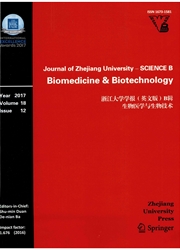

 中文摘要:
中文摘要:
研究目的:通过制备抗猪瘟病毒shRNA转基因猪,探索shRNA对猪胎儿成纤维细胞、克隆猪早期胚胎发育以及转基因猪的影响。创新要点:基于稳定表达shRNA的猪胎儿成纤维克隆细胞及shRNA转基因克隆猪制备的结果,发现shRNA对克隆猪早期囊胚发育阶段无明显毒性,并首次报道了在shRNA转基因动物中,shRNA引起体内miRNA通路过饱和及动物致死性等毒性。研究方法:实验构建了多种抗猪瘟病毒shRNA表达载体,转染猪胎儿成纤维细胞并筛选得到细胞克隆,结合体细胞核移植技术制备了shRNA转基因猪。使用实时荧光定量聚合酶链式反应(PCR)和蛋白质印迹法(Western blotting)检测了细胞及个体水平siRNA的表达量、干扰素反应相关基因、内源miRNA及通路因子的表达量,同时检测了shRNA克隆细胞囊胚率。重要结论:shRNA能有效抑制猪瘟病毒的复制。在猪胎儿成纤维细胞水平上,稳定表达shRNA能引起细胞内干扰素反应、miRNA通路过饱和等副作用;在克隆猪发育阶段,shRNA对克隆猪早期囊胚发育阶段无明显毒性;在shRNA转基因克隆猪个体水平上,shRNA引起克隆猪体内miRNA通路过饱和及克隆猪早期易致死等毒性。
 英文摘要:
英文摘要:
RNA interference (RNAi) is considered as a potential modality for clinical treatment and anti-virus animal breeding. Here, we investigate the feasibility of inhibiting classical swine fever virus (CSFV) replication by short hairpin RNA (shRNA) in vitro and in vivo. We generate four different shRNA-positive clonal cells and two types of shRNA-transgenic pigs. CSFV could be effectively inhibited in shRNA-positive clonal cells and tail tip fibroblasts of shRNA-transgenic pigs. Unexpectedly, an early lethality due to shRNA is observed in these shRNA-transgenic pigs. With further research on shRNA-positive clonal cells and transgenic pigs, we report a great induction of interferon (IFN)-responsive genes in shRNA-positive clonal cells, altered levels of endogenous microRNAs (miRNA), and their processing enzymes in shRNA-positive cells. What is more, abnormal expressions of miRNAs and their processing enzymes are also observed in the livers of shRNA-transgenic pigs, indicating saturation of miRNNshRNA pathways induced by shRNA. In addition, we investigate the effects of shRNAs on the development of somatic cell nuclear transfer (SCNT) embryos. These results show that shRNA causes adverse effects in vitro and in vivo and shRNA- induced disruption of the endogenous miRNA pathway may lead to the early lethality of shRNA-transgenic pigs. We firstly report abnormalities of the miRNA pathway in shRNA-transgenic animals, which may explain the early lethality of shRNA-transgenic pigs and has important implications for shRNA-transgenic animal preparation.
 同期刊论文项目
同期刊论文项目
 同项目期刊论文
同项目期刊论文
 期刊信息
期刊信息
